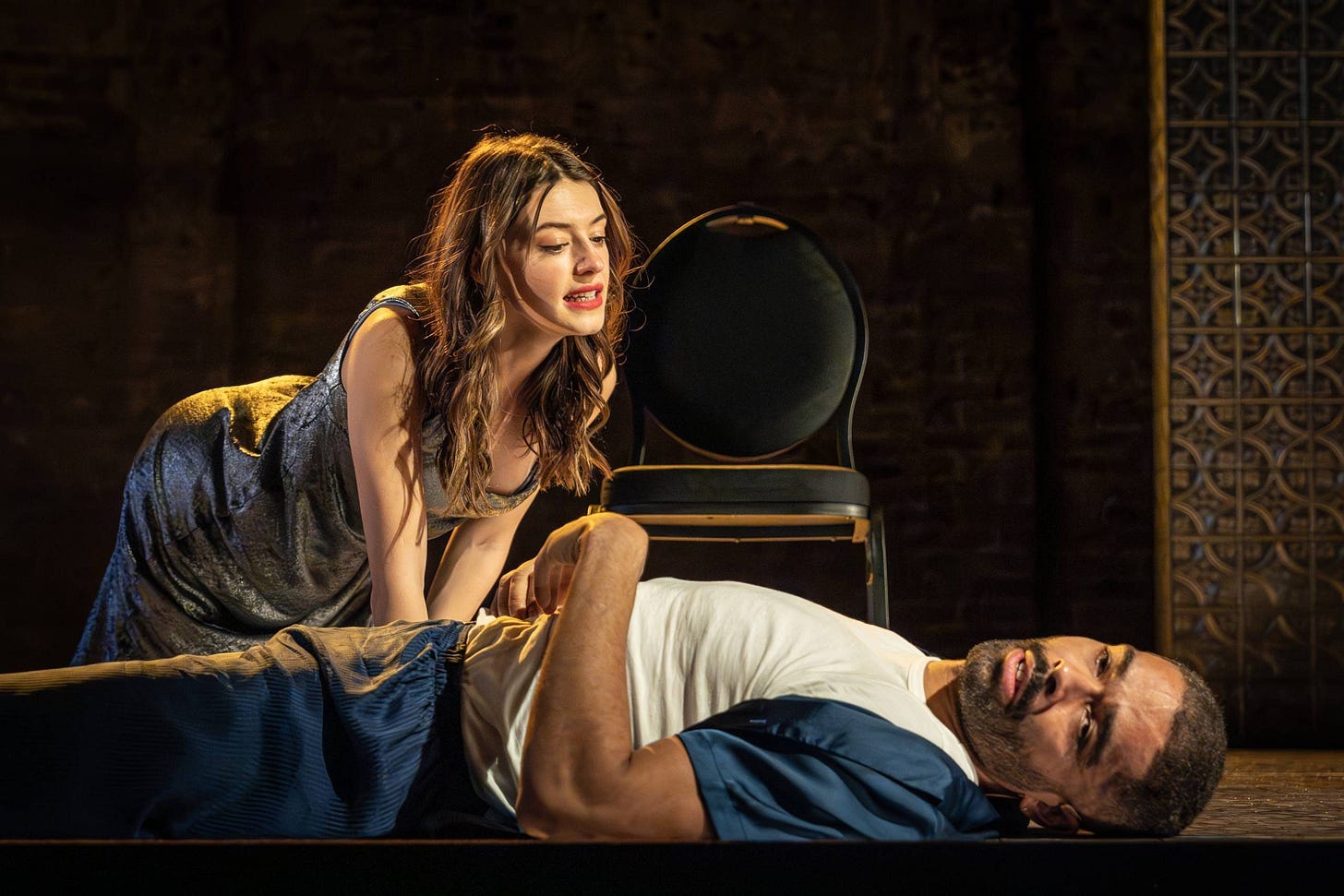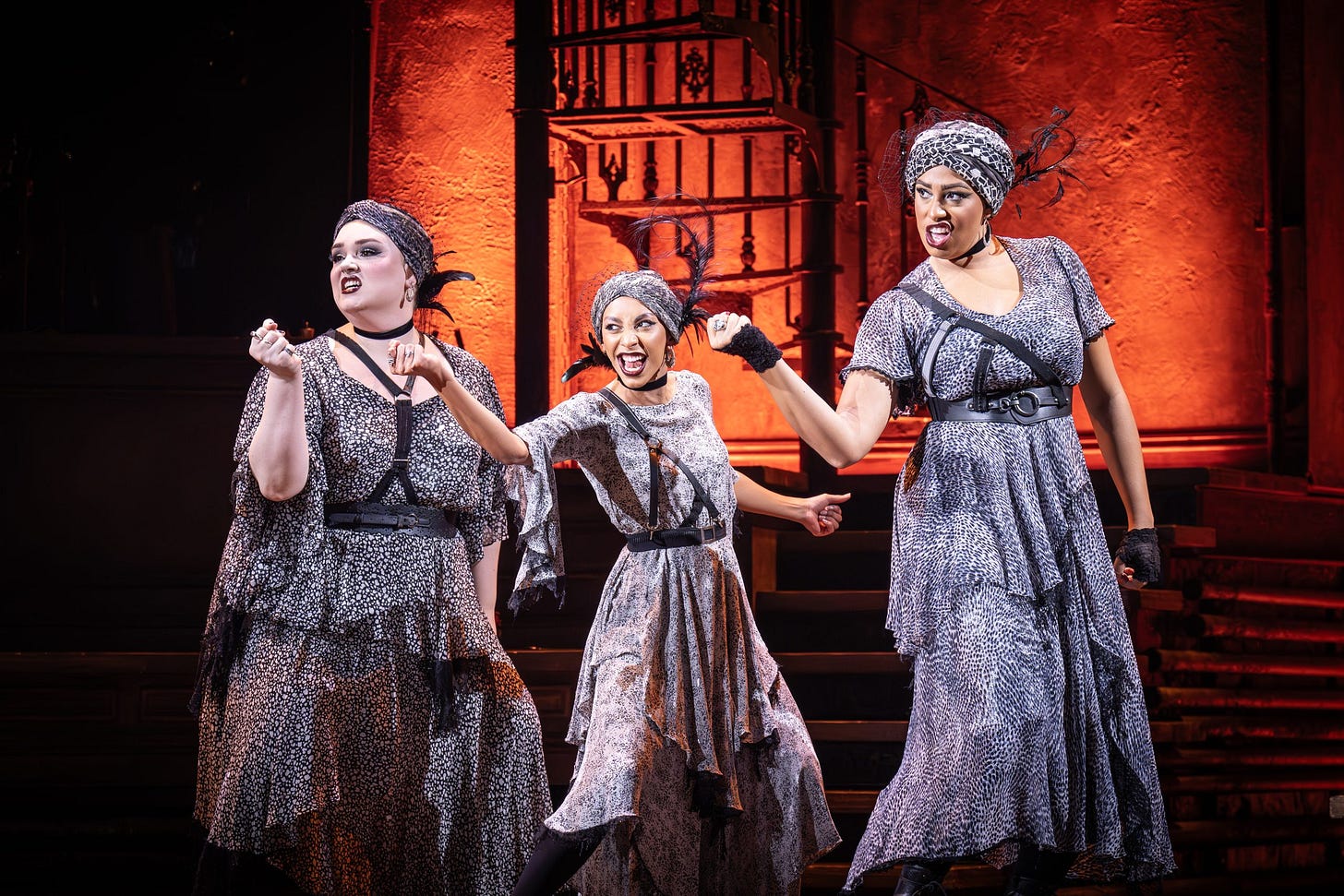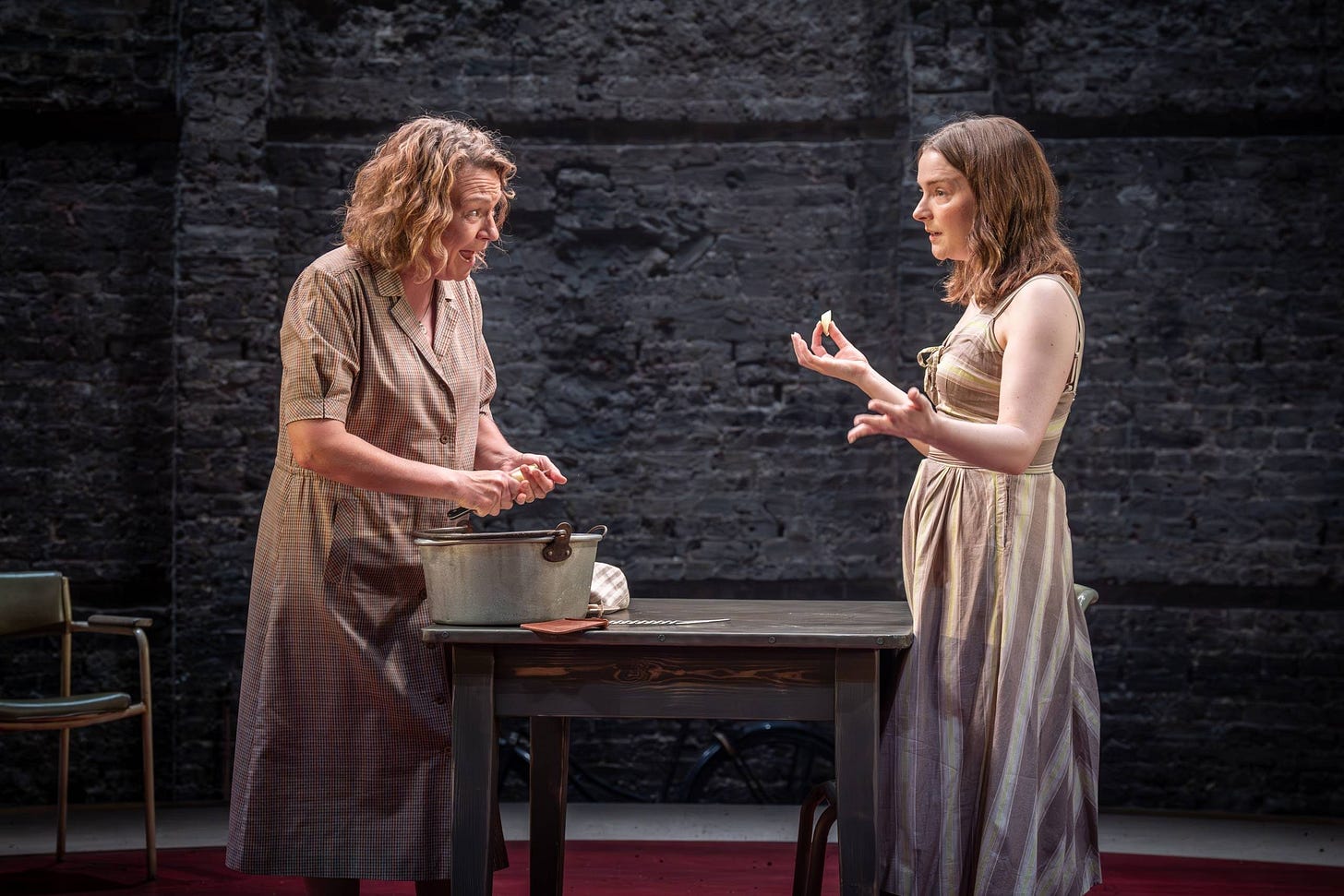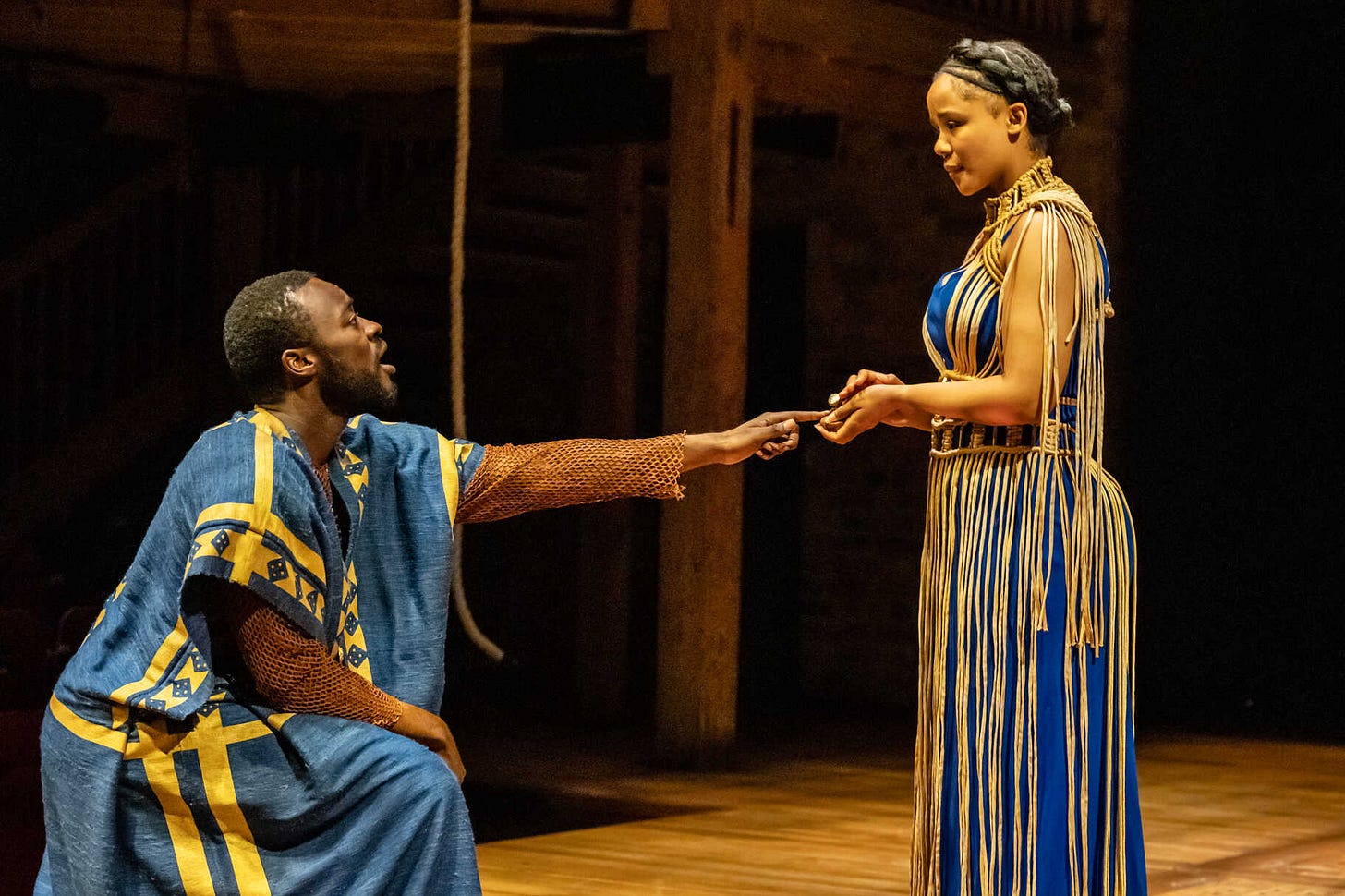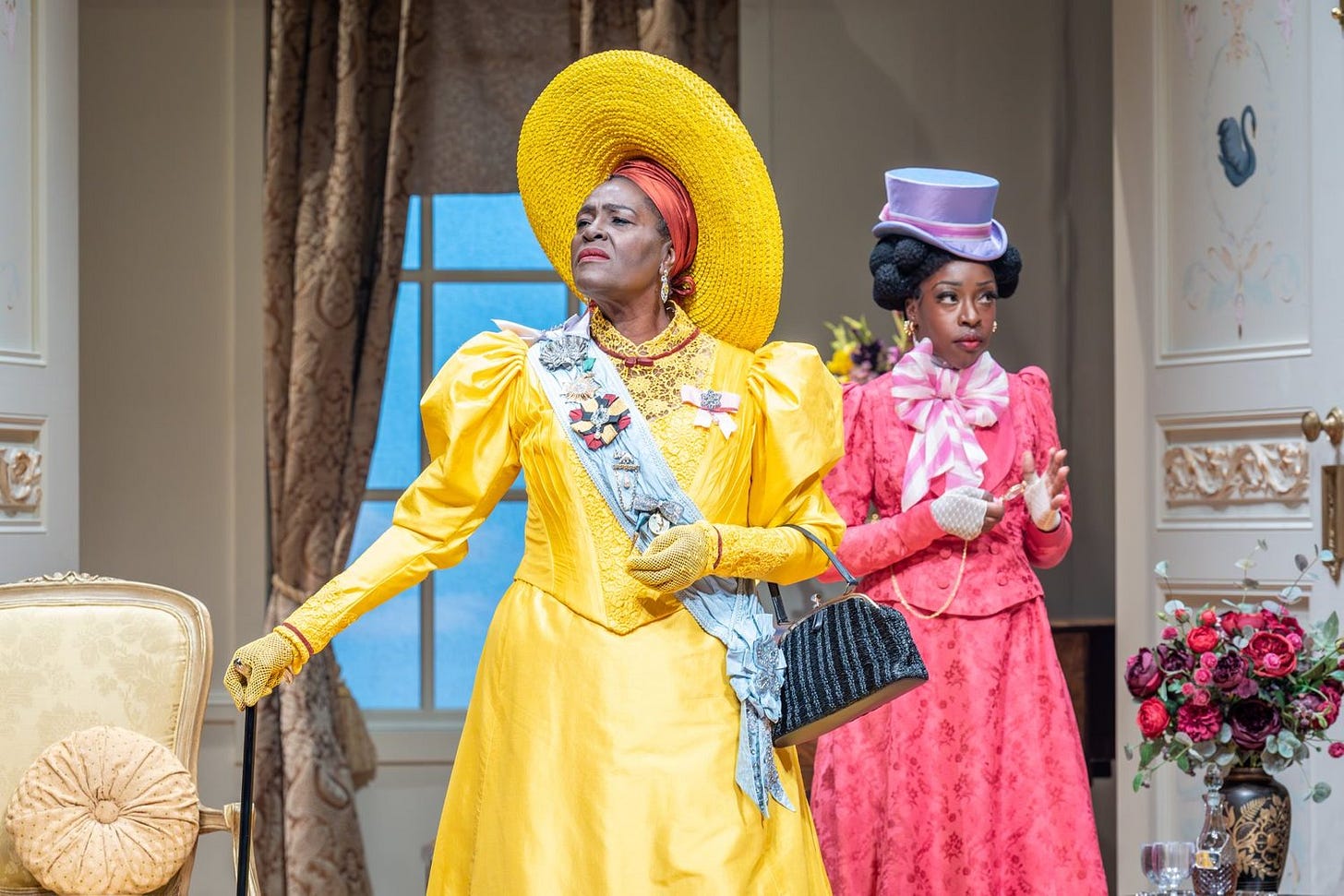Is it time to ditch accents on stage?
An argument with myself about default realism, cultural specificity, and class assumptions
By Holly Williams
If you’ve spent any time online in recent weeks, you’ve probably been accosted by umpteen ‘In’ and ‘Out’ lists for 2025, where people prove how cute/clever/cool they are by selecting what’s hot or not for the coming year. Don’t worry – I’m not about to offer a theatre version. But if I did, top of my ‘Out’ list would be: bothering with accents.
It’s been a bugbear of mine for years, this last bastion of default realism. Why, when we’ve done away with being literal in design, costume, performance styles, sound, and casting choices, do many productions still require actors to attempt an “accurate” accent? It seems like a hangover, a just-how-things-are kind of choice – and it can be a horribly distracting one.
But recently, I’ve been seeing shows that make me things think might be changing – that putting on an accent may be on the way out. I finally saw Hadestown in the West End over Christmas, and while, yes, this American show tilts at America’s Great Depression, it’s also about Greek gods and the underworld and a universal compulsion to re-tell stories… so of course this “old song” can be sung by a Scottish or an Irish Orpheus. And I don’t know if it’s a deliberate policy at Sheffield Theatres or mere chance, but both The Crucible and Little Shop of Horrors – both shows that could be held up as quintessentially American – had actors using their own voices during 2024. A Crucible where you weren’t worrying that the cast were worrying about trying to sound like 17th century Puritans was – to grossly adopt a voice myself – truly a blessing and a providence! And while updating Little Shop to the present day added bumps to the storytelling, a Brummie Seymour was a sheer delight.
Not that all accents on stage are apparently created equal: I am thinking largely, here, of American plays staged by Brits. No-one expects Romeo and Juliet to be done with an Italian flourish, thank god, or for Ibsen plays to be performed with a Scandi lilt. It’s when it comes to plays set in America that we still seem to default to at least attempting the appropriate drawl. Tennessee Williams, Arthur Miller, Eugene O’Neill, Edward Albee, David Mamet, Lynn Nottage… such writers always seem to draw out the dialect coaches. Current Deep South set shows such as The Little Foxes at the Young Vic or Cat on a Hot Tin Roof at The Almeida may mess about with the sense of where or when they’re set, updating costumes or sticking the cast inside a metallic box – but still preserve the accents.
I’m sure someone will argue with me that Williams’s ripe, heated poetry requires a certain delivery. But does it, really? Why is that the one thing we can’t liberate the shows from? I’ve seen several productions of Cat on a Hot Tin Roof that have pulled strenuously into contemporary, stylised, or expressionistic spaces – only the accent was preserved.
And also… it wasn’t always preserved. Not really. Some actors nailed it, and some were ropey. Brits often do get tangled up, trying to do Southern twang – and then that becomes the thing the audience snag on, too. When an accent wobbles, or when you can just feel the effort going into marshalling it, it draws unhelpful focus. You hear the actor, not the character; the voice, not the play. It can also be kind of embarrassing: watching shows on tenterhooks, waiting to hear what continent an accent might migrate to next.
So is all I’m really saying that badly-performed accents are Out? Not quite. Because then, arguably the answer would be just to drill actors in different vowel sounds… When honestly, I’d rather just suspend the old disbelief, and hear a great actor inhabit a great part fully, with their own voice.
And the question of which accents can be done also seems to get people in a pickle. I was struck by this when watching The Legend of Ned Ludd at Liverpool’s Everyman last year: a cast of three performed scenes set all over the world, rapidly shifting character and location. Part of that involved slipping into the ‘correct’ accents for, say, Nottingham or Detroit – but not for Lagos, presumably because that would have felt inappropriate for three English actors of different ethnicities. There was a rightful wariness, given the theatrical history of minstrelry, blackface, and cultural appropriation. So the actors just did that scene in their own voices.
That was surely the right choice, but then why bother doing special voices for any of the scenes? The inconsistency bugged me, a lil dramaturgical niggle – especially in an avowedly non-naturalistic show which explicitly acknowledged its own innate theatricality. But it also just exposed the sheer oddness of our wider approach to Putting On A Voice: that British actors are expected to list on their Spotlight which regional or American accents they’ve mastered, while certain other accents would be seen as offensively inappropriate to so much as attempt.
There are counter arguments, of course, to the idea of just doing everything in your own voice: I’ve heard people say that having the wrong accents is just as distracting as having the right one done badly. There’s a risk the audience will sit and wonder, well why is someone talking about streetcars in broad Yorkshire tones? We call ‘em trams ‘ere, love.
But I don’t think it would be that distracting, once it became more of the norm. Just as we’re used to women playing great male Shakespeare leads, or to adults pretending to be kids on stage, actors performing any part from anywhere and anytime in their own voice would soon just become part of The Magic of Theatre™.
Or would it?
I guess matters are almost always more complicated than an In/Out Hot Take or Definitive Pronouncement will really allow. Because of course, when you dig into it, some productions do benefit from being grounded in a specific place, a specific time, a specific class. Some plays are written with a certain dialect or slang that seem to demand naturalism – and do still get that kind of staging, too. We have plenty of productions in the UK that aim for a kind of hyper-specific, fine-grain realism, and in those cases, accents can be ropes to help tether the play.
I’m thinking, by way of example, of two lovingly detailed productions I saw last year: a classic, Arnold Wesker’s Roots with its characters’ Norfolk dialect, and a contemporary hit, Tyrell Williams’s Red Pitch, with its south London slang. A precise sense of place is baked into both those plays, and comes partly from the way the characters speak. And both productions committed to evoking a believable world via the realistic vocal delivery. Put simply: the accents really served that particular style of production. If they’d been all over the place, they might have felt more perverse than Magic™.
And what, then, of class? An identity that is often conveyed most clearly (or made assumptions about most readily) through the voice?
British audiences are finely attuned (and often horribly biased) as to what different accents say about class – and, by extension, presumed tastes, education, prosperity, ‘coolness’, and a host of other shifting, shifty signifiers. So what does it really mean for me to say that an actor should just perform in their own voice… given that audiences might read certain things into their voice? Things that the actor has not, and cannot, make a creative choice about: it’s just their voice.
Could we ever just read through this – learning to overlook perceived vocal class signifiers in the same way we are sometimes invited to overlook gender or race (hurrah hurah The Magic of Theatre™)? It sounds like laudable aim, to break through such stereotypes – and to be fair, theatre has already come a long way already in doing this.
For decades, working class actors and those with regional accents were told to tone them down, and were excluded from playing classic or serious parts, particularly in Shakespeare. That’s been changing, as Frank Peschier explored in an excellent previous Exeunt article – even it’s still not fully changed. As recently as 2022, audience members complained about Northern Broadsides doing Shakespeare in Yorkshire accents (hilariously, given that’s the point of the company). As recently as 2022, it still felt genuinely a big deal to have a Black Country Hamlet at the Globe. And as recently as just-last-summer, I found myself eye-rolling at still seeing ‘low-life’ comedy roles in Shakespeare signalled by broad accents, in contrast to noble RP (I’m looking at you, RSC Pericles, with your Cockney-accented brothel scenes!)
So yeah, just having everyone use their own voice, for any part, no matter how ‘high’ or ‘low’ status they are, sounds good. Buuuuut… it once again all comes down to the show, and the specificity of it. Hamlet is rarely played as, say, a study of exactly how class intersects with youthful masculinity and entitlement in contemporary British society; Hamlets don’t have to sound like Prince William. But The Bullingdon Club boys in Posh, for example, probably do need to sound like him. In plays that are literally about class struggles, it would be weird to pretend that the accents of the cast don’t convey their own meaning about class.
And is there also a question of appropriateness here, too? Yes, we’ve got to the point where you can have a Shakespearean king with any accent – but would we feel weird about it the other way round? Would we accept, say, a cut glass Eddie in A View From the Bridge, or A Taste of Honey where Jo sounds like she has a silver spoon in her mouth? Maybe neither of those plays have to be staged as absolutely realistic depictions of 1950s Brooklyn or Salford – but casting a very posh lead speaking in their own voice might jar, no matter how abstract a production otherwise went.
So this sounds like another stumbling block in my ‘just do it in your own voice’ drive: Won’t somebody think of the private school RADA grads who’d be excluded!
But working class actors have long been discriminated against for their accents – so maybe a cast-any-accent-as-long-as-it-isn’t-RP approach to working class roles would merely be levelling an uneven playing field: only 7.9 per cent of those working in the creative industries come from a working class background, after all. Just as we accept that certain roles should only be played by people from that ethnic background, perhaps certain working-class roles – roles where power dynamics around class are an essential and unignorable part of the play – should only be played by people from that background.
I suppose – after writing about a zillion words – my grip on my JUST USE YOUR REAL VOICE diktat may seem fatally weakened. I’m sure readers will pick other holes in the argument too! But one thing I can hold fast to the idea that accents should at least be interrogated in the same way as any other aspect of a production.
And mixing things up when it comes to accents, and our expectations around them, can pay real dividends – whether it’s simply releasing classics from pointless convention and wobbly vocal techniques, or as an active part of applying fresh interpretations and new lenses to familiar texts. Look at The Importance of Being Earnest at the National currently, where Sharon D. Clarke is credited as being the first actress in decades to really put a new stamp on that most famous Wildean line: “A handbag.”
How? By giving the elegant Lady Bracknell a rich Caribbean accent, delivered with resplendent haughtiness. But then, that accent is not Clarke’s own – even if she is drawing on her heritage to create this distinct and different Lady B.
So maybe it’s less about speaking with only your own authentic voice – and more about only adopting a certain accent if that actually, definitely brings something to a part. To make affecting an accent the active choice, rather than the default.






